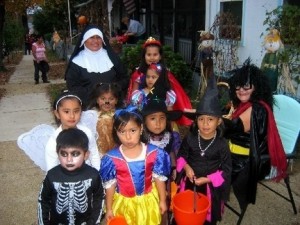 Halloween or 万圣节 (Wàn shèng jié) is fast approaching, so get your costumes or 服装 (fú zhuāng) ready! Last year everyone and their kid brother was Lady Gaga (including guys), but I got a strong feeling that there will be more Qaddafi’s than Beijing knows what to do with them. Halloween is a time to cut loose and do something very un-Chinese: lose your face or 丢脸 (diū liǎn)–quite literally. So grab your costumes and go wild.
Halloween or 万圣节 (Wàn shèng jié) is fast approaching, so get your costumes or 服装 (fú zhuāng) ready! Last year everyone and their kid brother was Lady Gaga (including guys), but I got a strong feeling that there will be more Qaddafi’s than Beijing knows what to do with them. Halloween is a time to cut loose and do something very un-Chinese: lose your face or 丢脸 (diū liǎn)–quite literally. So grab your costumes and go wild.
Halloween’s roots, interestingly enough, come from an Irish-Celtic (no not the basketball team) tradition of Samhain celebrated on the eve of All Saints’ Day hence the phrase Hallow’s Eve which became shortened to Halloween. Similarily, in Mexican culture, people celebrate Dia De Los Muertos (Day of the Dead) which follows All Saints’ Day as an honoring of the dead and relatives.
In both traditions, costumes are worn to scare away bad or evil spirits, while food offerings (namely sweets or candies) are presented to both honor the dead and celebrate the living. While initially a Catholic-Christian religious holiday, Halloween has evolved into a secular holiday, celebrated the world over by people looking to wear crazy outfits, eat, drink and revel with friends.

Contemporary traditions of Halloween also include “trick or treating”, or the going from door to door to ask for candy or some kind of surprise (or both). This often includes a “hauted house”, “haunted hay ride” or some kind of set up in which people catch you off guard and scare the 大便 out of you.
Pranks are also popular, namely when it comes to messing up someone’s property. In the United States, teens often throw raw eggs at houses that refuse to give candy and partake in “TPing” or “toilet-papering” a house by throwing roll upon roll over the house, into trees and on the persons lawn. I don’t see much TPing in China, namely because toilet paper is a highly valued, and an always out of stock commodity in Chinese bathrooms.
 Finally because Halloween is associated with autumn or 秋天 (qiū tiān), many of the festivities revolve around harvests. This is why many North Americans and Europeans partake in pumpkin carving of jack’o’lanterns or 鬼火 (guǐ huǒ), bobbing for apples and outdoor activities such as trick or treating, haunted hayrides, and buring bonfires. In fact, the Celtic word Samhain literally means “the end of summer” and coincides with the turning of the leaves from green to a wide array of red, orange, yellow and brown.
Finally because Halloween is associated with autumn or 秋天 (qiū tiān), many of the festivities revolve around harvests. This is why many North Americans and Europeans partake in pumpkin carving of jack’o’lanterns or 鬼火 (guǐ huǒ), bobbing for apples and outdoor activities such as trick or treating, haunted hayrides, and buring bonfires. In fact, the Celtic word Samhain literally means “the end of summer” and coincides with the turning of the leaves from green to a wide array of red, orange, yellow and brown.
Happy Halloween Everyone! 万圣节快乐!
Follow Steve on Twitter: @seeitbelieveit


Comments:
Alex Stewart:
Thanks for the great holiday Chinese vocabulary lesson! Did you ever think about the similarities between Halloween and the Hungry Ghost Festival? Check out the comparison in the newest post on the San Diego Chinese Historical Museum blog: http://sdchm.blogspot.com/
redwan Islam:
they are looking a great joker ..